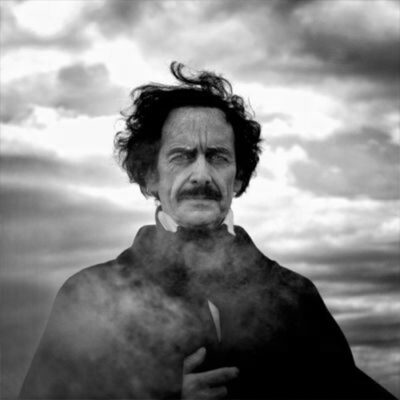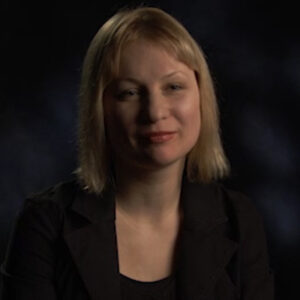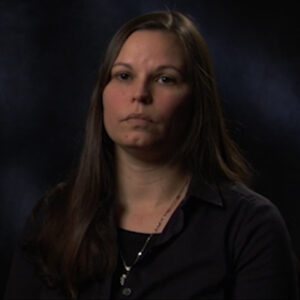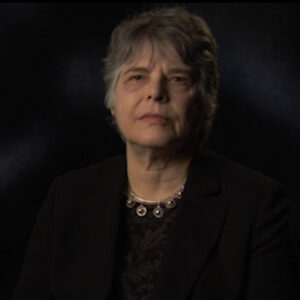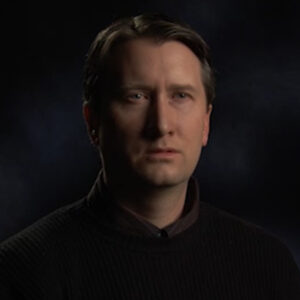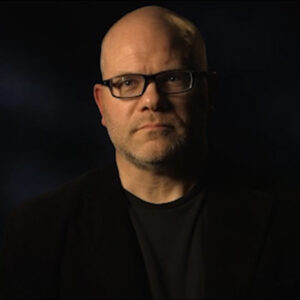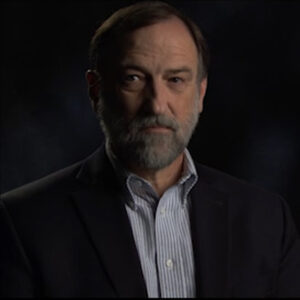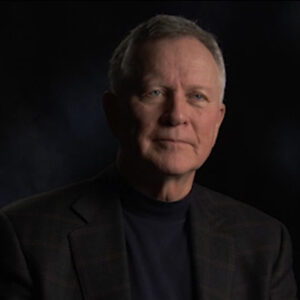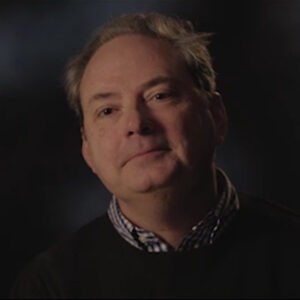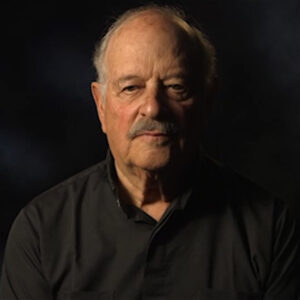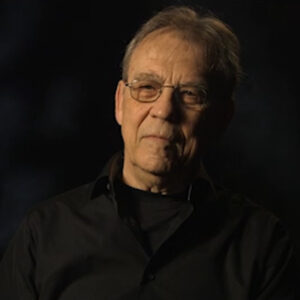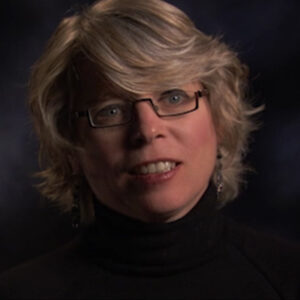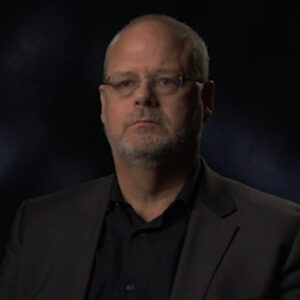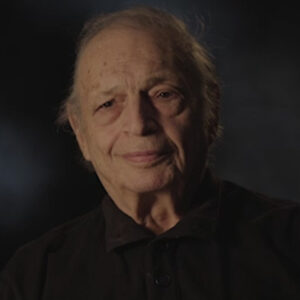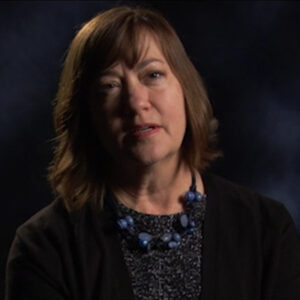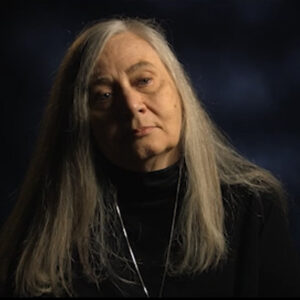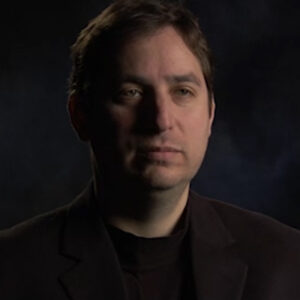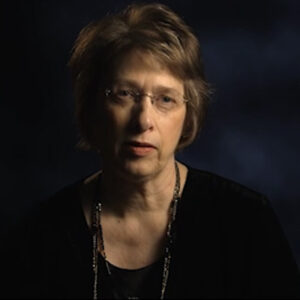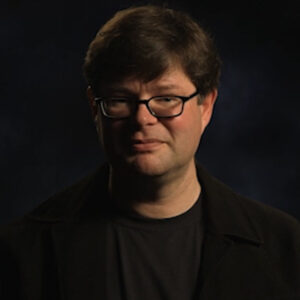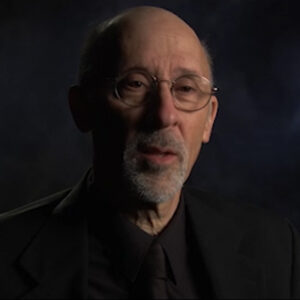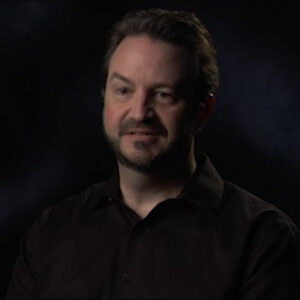Speaker Well, OK, let me ask this question. OK, so so this issue of Poe’s biography and Poe’s work, because that’s one of the things that fascinates us, is why is Poe’s life completed so often with his works when other writers don’t suffer that kind of thing?
Speaker Well, I would say just sort of a preface, which is probably not part of the question, but that happens with a lot of writers with Poe. Part of what has come down to us and has been built over the years is a mythological, unremittingly dark, Gothic figure. And part of that is the way he depicts women in his work. So we have he famously said that the death of a beautiful woman is the most poetical topic that’s available to a writer.
Speaker And there are plenty of dead and dying and resurrecting women in his work, such as the fall of the House of Usher, Annabel Lee, The Raven as well. And so that’s very much a part of his image. And that’s important in the very complicated things to say about that. But he also interacted with real women, a lot of real women. He was a part of the literary marketplace. He was a businessman. And there were a number of women were really making inroads. Literary women writers were making inroads into the the marketplace, in fact, becoming quite successful, and therefore were competing with pope and competing with pope, both in terms of literary reputation, reputation, trying to make a living. And that was something that pope certainly struggled with, and that was something that a lot of women writers struggled with as well. And so there was there was sort of a mutual relationship that sort of a mutually beneficial relationship between PO and women writers that it is. He would tend to review women quite favorably, perhaps more favorably than he did men, although he never really entirely relinquished his high critical standards. And he also would put women he was an editor of a number of journals and he would put women poets sort of on the page when a woman writers poem and his poem side by side. So he benefited from the woman’s popularity. She benefited from, you know, perhaps his editorial, his entrepreneurial, and then he benefited from his entrepreneurial. What am I trying to say?
Speaker When you start over again, you would put a woman’s poem on one side in his own right.
Speaker OK, one of the things that poet do in terms of really drawing on women writers popularity to benefit his own reputation was to put on one of the journals, for example, the Broadway Journal that he edited, the poem of a woman writer side by side with a poem of his own. And so therefore, these women were often really quite popular and drew a big audience.
Speaker And so he benefited from that juxtaposition. And as an editor who had a good deal of influence in the marketplace and also just simply had access to print and put women in print. And so there was this really reciprocal, I think, benefit. That’s great. OK, interesting.
Speaker So.
Speaker When he first got started, late 20s, right around 18, 30 and starting to get a career going, what how were women writers considered in America, women writers and poets, and how did that change during his career during the eighteen 30s and 40s?
Speaker OK, what was happening with women or OK in the early 19th, 19th century going forward start started. OK, you want to dry out. Yeah.
Speaker OK, there was quite a change that happened to transition a development as far as women writers in America were concerned in the 19th century, starting really in the 1920s, I would say, in terms of a development or the 1920s, 1823. OK, all right. Yes. That’s not going to be good. OK, so in the 19th century, there was a considerable change in the status of women writers in the 19th century, starting fairly early in the 19th century in terms of the development of what came to be called a sentimental literature, both in poetry and in novels. And there was, in general, strong feeling, I think, of threat for male writers in terms of their own literary low right to start with, in terms of their OK, in terms of their own literary reputations, their ability to make a living. And and that really kind of developed over the course of the century that I’d say the height of that was the 1950 of 1850. I’d say the height of that was the 18th 50s. And so Poe was writing before that. But nonetheless, it was really a dynamic that was part of his literary environment.
Speaker And some people said that as a critic, he was he was he held women do exactly the same same Hirsch standards that he held male writers to.
Speaker What’s your take on it when it comes to how Poe treated women in comparison to men as a reviewer? And he was famously he could famously be brutal in his reviews. And there’s a question as to whether he treated women in the same sort of way. There’s a debate and it seems pretty clear that while he did criticize women, that he often soft pedal did a little bit. And what I find is that he will often praise a woman writer, but then suggest that she’s really not.
Speaker Well, not not she’s really not quite what she should be or what she could be. Let me start that again. He will often, along with the praise that he lavishes on women, women writers to some degree, also suggest that she’s not realize her potential and that there are things that he could help her with. You know, he’ll point out particular weaknesses or areas in which she could improve her writing.
Speaker It’s good. OK, so what about his personal relationships with women, you know, his friendships? Was he?
Speaker Oh, no, actually, I know what my question was posed to as of self invention, of of an identity of a Byronic identity. What do you think about that? Can you talk about how he tried to to create a certain image for himself in relation to women, you mean?
Speaker Yeah, the public in general, but especially women like this might be kind of an oblique way of answering your question, but how in his relationships to women writers was often engaged in sort of a mutual self invention and this often often happened in print. There were a number of literary flirtations that happened versus that was printed by Poe and then a response from a woman writer. And it was a very, you know, a publicly constructed flirtation, not to say that they weren’t sometimes genuine affections or attractions, relationships with the women, but there was this very marketplace oriented way of inventing yourself in print.
Speaker And can you say a little more about that, that it was a ploy to sell more copies? Is that what it was about?
Speaker And part of what that has to do with is, in fact, that Poe, for example, or was a very strong economic consideration and being able to get in print, being able to make money, which was a struggle most of his life, that was something that was at the forefront of his mind. I think much of the time women often were in a position where they were having to support their own families, contribute to their own family’s well-being. And so that was also a consideration for them, I would say. And that’s part of the of the reciprocal relationship of mutual benefit.
Speaker It’s good. Thank you. How do you think he how do you think women saw him?
Speaker When I’m talking about, you know, this is like around eighteen forty five of the Ravens been a big hit. He’s quite the man about town.
Speaker How do you think you know some of these stories, don’t you? Oh, yes. You know, we have some, but we need someone to say to them. We can say, I know. I know them.
Speaker For some time when Poe was really at the height of his popularity, was doing fairly well as a writer and public, was part of the literary salon circuit, and he was very well. He was admired by many people. He was admired by women. And there are stories about women being effective and very affected. By the way he recited The Raven, for example. And there was talk of his having kind of a mesmeric effect as a speaker in that way and as a lecturer, too.
Speaker I mean, not just reciting the Raven, but you have you seen accounts of that, that he would speak in a kind of low voice?
Speaker And I don’t know too much about that, but I’m not surprised, though.
Speaker OK, um, uh, how did he portray you talked a little about this before, but without acknowledging that, how did you portray women in his writing, women characters that he created? How do you see them?
Speaker Part of the mythos of of Poe, the popular image of him that still has quite a bit of sway, you know, for people who know of his work, had to do with the way he portrayed women in his work and. Where should I start again, I’m saying the same thing I was saying before, is that all right? Or let’s just say it again, because it’ll probably come out differently. You probably will. OK. Part of the popular image that still has quite a bit of sway amongst the reading public had to do with the way Poe depicted women in his work. He famously said that the most poetical topic in the world for a writer is the death of a beautiful woman. And so there are a lot of women who do just that and his writings who die, who are dying in the course of the poem or the story or who are being revived, resurrected. Oh, I don’t know what else to say about.
Speaker Well, OK, I’ll ask a few more questions. What do you think it means that that some often in the stories women are buried alive.
Speaker That would get into probably a critical question, are you looking for a biographical answer to that?
Speaker Yeah, either one. OK.
Speaker I’m not finding a real easy answer to that, that one wouldn’t skip that.
Speaker Sarah, how can you talk about her in any specificity? Not too much. I mean, just who she was and who she was.
Speaker Dipo and what happened between them?
Speaker One of the women, literary women with whom Poe had a relationship with Sarah Helen Whitman. And for quite some time, she was most famous for having had a brief romance with Poe, for having been a medium, a spiritualist who claimed to be able to channel Poe after he died for having been the inspiration of one of his poems to Helen. And however, in her own right, she was a very well respected literary critic. She was a poet, a writer. And so that’s part of that sort of complex relationship that she had with women. And there was also the flirtation, a public in print flirtation between the two of them, as there was with other women in the literary marketplace.
Speaker And at one point there was even possibility of them getting married after his wife had died, right?
Speaker Yeah, I think that’s the brief romance, right? Yeah.
Speaker At one point there was a possibility of their getting married and you can say what happened. You know, that’s a part of it. I don’t know. I don’t have everything at my fingertips. So that’s took, um.
Speaker We so for the beginning of our film, we’re trying to do this sort of as a sort of montage of statements of what people know, the place that holds in popular culture. So how would you if you just had to sum it up in one sentence, two sentences, how is Poe what is the place he holds in popular culture in America? And why why is he so enduring?
Speaker Power has an enduring and a very strong continuing influence on the popular mind, on popular culture. And I think part of that has to do with the way his biography, his life, which was in fact quite tragic, connects with his his works, which to some degree are very dark, very tragic, very grotesque, very gothic. But not everything he wrote was like that. And so one of the things that’s important to me is that the complexity of the man and of his work is brought to light.
Speaker And the mystery of his death, the mysterious circumstances.
Speaker What do you think that has to do with the mythology of power? How important is that and why does that matter?
Speaker My question about the mystery of his death would have to do with to what extent that actually is known by people who are popular enthusiasts of Poe.
Speaker It certainly is in keeping with the way that we think of Poe and the darker side of his experience, the darker side of his writing. And it certainly feels angry.
Speaker She’s impatient. Where were we?
Speaker The the mystery of his death, why do people become absorbed by why does it matter to the mythology of power when it comes to the mystery of death?
Speaker It may or may not be very broadly known amongst parentheses. It’s certainly something that gets discussed a lot amongst literary critics and biographers. But it certainly is very much in keeping with past life, with the tragedies of his life, with the struggles that he had professionally, just simply to live and to support his family. And it’s this kind of a strange thing that his life seems to have played out, I suppose, to some extent what he wrote about.
Speaker That’s nice, um. The portraits of Poe, the iconic the Garaty portraits.
Speaker Can you talk a little about what role they play? Why why is that likeness so ubiquitous?
Speaker There are a number of daguerreotypes of HPO, one of the things that’s interesting about them is that he was very conscious of self invention, of self presentation when he was going to be photographed. So whereas declaratively really had a new capability of capturing a realistic portrait of a person, nonetheless, it could be manipulated by the sitter. And I think that was probably pretty canny about that.
Speaker The door closed. Yeah, there’s something whacking away out there closed. Do you mind if we do that again just because I’m hearing that door banging back there? But it was great.
Speaker Interesting. I’m trying to think about the history of that particular type of game in the 30s. Um, well, it started in 1947, I believe. Do you want to look at any of the, um, I’m not sure it would affect all I have to say, because I’ve been thinking about and writing or editing a piece that had to do with this. All right. Well, it’s just I mean, don’t worry about having said it before, just saying the same thing again. So so what do is the images of here I have to do with his.
Speaker His his ubiquity in culture and popular culture and his endurance, the portraits of PO, in particular, the DeCaro types, I would say really kind of support and feed into a popular iconic image of pop up in his own time in an hour time. And part of that I attribute to the fact that he was quite canny about self presentation, whereas Daguerreotype provided a new ability to capture a kind of verisimilitude, you know, a realism in contrast to a painting. At the same time, somebody who was really thinking about self invention, how he wanted to be presented to the public, could in fact manipulate some aspects. When he was sitting, when he was dressing, when he was arranging himself for the for the session.
Speaker Nice, that’s interesting, no one else has said anything quite like I happened to be editing a piece that has just to do with ourselves. Yeah, yeah.
Speaker Oh, good. Is there anything more that about his images of Paul?
Speaker There is one I don’t know if this would be of interest, but. There is a European portrait of ho, not a decorative type that is quite interestingly different from most of the other portraiture. He looks European. He there is a romanticized. Feeling about that particular portrait that just goes to show, you know, how people appropriated him and of course, he was very in France, he had a much more prominent reputation with the simplest than he did for a long time in the United States. And that may, in fact, have something to do with that particular European portrait.
Speaker And how about the fact that so many artists in other genres and in other kinds of media appropriated or appropriated his life, his stories conflated them?
Speaker Why is he such an invitation to artists, to painters, to musicians, composers, filmmakers?
Speaker That’s something I have to give some thought to, I mean, clearly, he was you know, he is really amenable to all kinds of adaptations from very early on, right up to the present day and a variety of mediums, music, film, of course. You know, I have to think about that one, because that’s kind of a big for me at least that would be a big question that would require some rumination.
Speaker OK. All right. Um, anything else I think we covered. Yeah. Yeah, yeah. Um.

